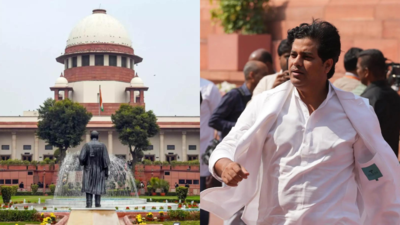
SC Quashes FIR Against Imran Pratapgarhi, Emphasizes Free Speech
NEW DELHI: The Supreme Court on Friday dismissed an FIR against Congress MP Imran Pratapgarhi, reinforcing the constitutional right to free speech and expression.
Pratapgarhi had challenged an FIR filed by the Gujarat Police over a social media post featuring the song “Ae Khoon Ke Pyase Baat Suno”. The two-judge bench, comprising Justice Abhay Oka and Justice Ujjal Bhuyan, ruled that no offense was made out against the Congress leader.
The court stressed that police must analyze the meaning of words before registering FIRs in such cases.
Court Defends Freedom of Expression
The Supreme Court upheld free speech as essential for a dignified life under Article 21. It stated that in a healthy democracy, people should counter opinions with other viewpoints instead of suppressing them.
“Even if many dislike certain views, the right to express them must be respected and protected. Literature, poetry, satire, and films enrich human life,” the court observed.
Justice Oka further emphasized:
“Judges must uphold fundamental rights, even if they personally disagree with certain expressions. Courts must prevent actions based on insecurity or perceived threats to power.”
Background of the Case
Pratapgarhi had filed an appeal against the Gujarat High Court’s January 17 order, which refused to quash the FIR, citing the ongoing investigation.
On January 3, authorities booked him after a mass marriage event in Jamnagar, where a provocative song allegedly played. The FIR referenced a 46-second video shared on X, in which Pratapgarhi waved to the crowd as flower petals were showered on him.
The Gujarat Police charged him under:
-
Section 196 (Promoting enmity between religious groups)
-
Section 197 (Harming national integration)
Officials claimed the song in the background could incite unrest and harm religious unity.
Final Verdict
The Supreme Court’s ruling marks a significant stand on freedom of expression. It reiterates that legal actions cannot be based on subjective fears or political motivations.
With this decision, the court has sent a strong message about safeguarding democratic rights in India.

